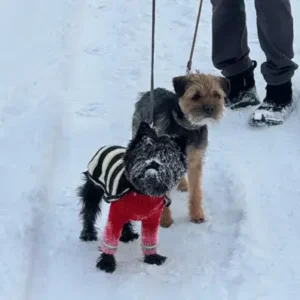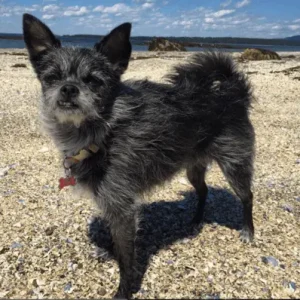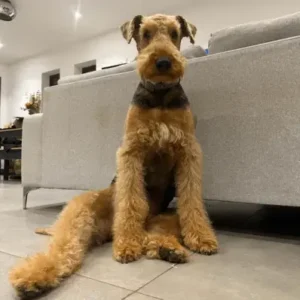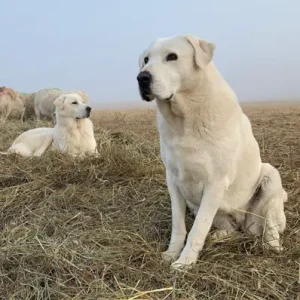Afador History/Origin
The fascinating history of the Afador dog traces back to the rich landscapes of Alaska around 2000 years ago. This hybrid dog breed originated from the intentional crossbreeding of the Afghan Hound and the Labrador Retriever, creating a unique canine companion that embodied the qualities of both parent breeds.
Afghan Hound – Source : Pixabay
Labrador Retriever – Source : Pixabay
Afador – Source : animalsonplanetlove
Afador Personality
Afadors is a dog breed known for their friendly and outgoing personalities. They inherit the Labrador’s friendliness and the Afghan Hound’s independent spirit, creating a loyal and charming dog. They thrive on social interaction and are great with children and other pets.
However, training this dog breed can become challenging due to their high energy levels. While they make great friends with children, you must also be extra careful while letting kids play with them. Their athletic nature requires some caution around small children to avoid unintentional rough play. Once these dogs are properly trained, they make great companions not just for their friendliness but also loyalty. Their deep-rooted bond with the family makes them reliable protectors. They also require regular physical activity and daily walks to prevent them from becoming lazy and dull. So, if you’re someone who enjoys daily walks with dogs, Afador is a great dog breed for you.
Afador Physical Appearance
Afadors are strong dogs, medium in size, with a slender build. Their slender body and long legs resemble the appearance of a Labrador Retriever. With a round head, a long muzzle, a brown or black nose, and eyes that are dark and almond-shaped giving them that always-curious look, these dogs are known for their striking appearance. Their eyes are often brown, and their nose color may vary with different Labrador and Afghan Hound mixes.
- Size
They are considered medium-sized dogs, weighing between 50 lbs to 70 lbs. Their heights mostly vary around 20 – 27 inches depending on the gender of the Afador.
- Coat Color
Their coat usually features a straight and fine texture. Depending on the lineage of the dog, their coats come in brown, black, cream, gray, or even red colors. The thickness of their coat also varies. However, most commonly, they have a medium-dense coat.
Afador Gender Differences
Male Afadors are almost always notably taller and bigger looking than female ones. An average 18-month-old male Afador dog weighs around 5 lbs more than a female one. Female Afadors may tend to have narrower heads, while male ones have big, round heads.
Afador Feed/Nutrition
A balanced diet is crucial for an Afador’s overall well-being. Provide high-quality dog food suitable for their size, age, and activity level. Their dietary needs also fluctuate throughout their puppyhood to adulthood. These are some general nutrition needs of an Afador: Adequate amounts of carbohydrates from vegetables, berries, herbs, and pineapple can provide essential nutrients and energy for your dog.
- Protein from healthy meat sources.
- Omegas and fatty acids.
- Enough hydration from hydrating foods and water.
- Minerals and vitamins from natural sources.
Regular exercise is essential to maintain their health. It’s also important to portion the amounts of nutrients and foods according to their age, size, and activity level. It’s important not to overfeed your Afador dog, as they easily gain weight. You want to avoid giving them too many calories, as this can lead to obesity and all the health problems that come with it. Stick to the recommended serving size on their food bag, and measure their food accordingly.
Afador Health
In terms of health, Afadors generally exhibit robustness; however, like any breed, there are particular health factors to be cautious about.
- One common concern for Afadors is hip dysplasia, a condition where the hip joint doesn’t fit into the hip socket correctly. This can lead to discomfort, lameness, and, in severe cases, arthritis. Regular exercise and a diet tailored to their specific needs can contribute to maintaining joint health.
- Another condition to be aware of is elbow dysplasia , a developmental abnormality affecting the elbow joint. This can result in lameness and arthritis over time. Monitoring their movement and consulting with a veterinarian can aid in early detection and management.
- Afadors may also be susceptible to canine gastric torsion, commonly known as bloat. This is a serious condition where the stomach fills with gas and twists on itself. It’s more common in deep-chested breeds, and symptoms include restlessness, a swollen abdomen, and unsuccessful attempts to vomit. Immediate veterinary attention is crucial if you suspect bloat.
Disclaimer: Not every Afador will have these health problems, and each dog is different. It’s crucial to talk to a vet about what’s best for your Afador and how to keep them healthy.
Afador Care and Grooming
Afadors require regular grooming to prevent matting because of the length and thickness of their coat, and they may shed moderately. Combs and bristle brushes work well with these because the texture of their coat is pretty fine. They also may require regular cleaning and shampooing, because they tend to enjoy outdoor activities. If you are shampooing regularly, it’s important to make sure you use a mild shampoo. Their long ears need regular checks and cleaning. Afadors’ nails grow relatively quickly, so you’ll need to trim them every couple of weeks. You can take your dog to a groomer or vet for help if you’re uncomfortable doing this.
You should also brush your Afador’s teeth at least once a week to prevent tartar buildup. Overall, brushing a few times a week, regular nail trims, and dental care are essential for their grooming and maintenance. These dog trainig tips will help you to have a happy dog.
Afador Rescue Groups
Consider adopting an Afador from reputable rescue groups that specialize in mixed breeds, such as:
How much does Afador cost?
The cost of an Afador typically ranges between $800 to $1,500, depending on factors like breeder reputation and location. Additional costs for training, healthcare, and supplies can increase the overall cost of owning an Afador.
Interesting Facts
- Afadors excel in canine sports, displaying impressive agility in activities like agility trials and obedience competitions.
- Afadors are not just friendly with people but also thrive in the company of other pets, making them ideal companions for households with multiple pets.
- With their inherited intelligence from the Afghan Hound and Labrador Retriever lineage, they are quick learners and sharp-witted.
- Beyond their friendly nature, Afadors showcase versatility as guides and working dogs, contributing effectively to various tasks.
Best For
Afadors make excellent family pets, companions for singles or seniors, and are well-suited for those with an active lifestyle.
Afador Top Names
Here are the top name recommendations for male and female Afador dogs:
| Male Afador Names | Female Afador Names |
| Max | Athena |
| Duke | Luna |
| Charlie | Sophia |
| Cooper | Mia |
| Rocky | Willow |

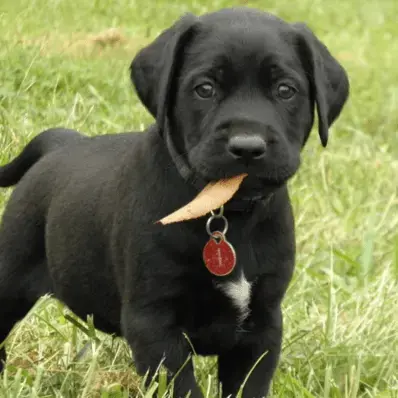
 Afghan Hound – Source :
Afghan Hound – Source :  Labrador Retriever – Source :
Labrador Retriever – Source :  Afador – Source :
Afador – Source : 




